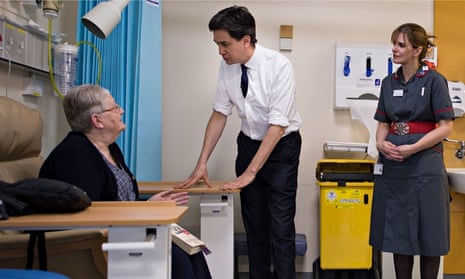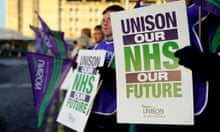Labour is launching its pivotal election pledge on the NHS on Tuesday, promising 36,000 more staff and the repeal of privatisation laws. It also promises to end the culture of 15-minute visits by care workers by recruiting an extra 5,000 of them and changing the incentive structure.
Labour said the number of days that patients were left in hospital beds because they could not be discharged was at a record high; in the past year, more than a million days were lost, adding £278m to the NHS bill.
Ed Miliband will make the pledge in Trafford, Manchester, the site of the first NHS hospital as a new BBC poll by Populus shows the NHS is seen as the single most important issue for the electorate in terms of subjects they want covered in the news, slightly different from asking what is the most important issue in determining someone’s vote. The Labour leader will say there is no country that runs a world-class national healthcare service with public spending as low as a proportion of GDP as proposed in 2019-20 by the government in the autumn statement.
He will claim: “One of the country’s most precious institutions faces its most perilous moments in a generation. The future of our NHS is at stake in this general election.”
Labour has already set out plans that will provide the NHS with an extra £2.5bn each year by the end of the parliament, but health experts have suggested the figure is below the extra funding needed to meet rising demand.
Labour makes six specific pledges including integrating care from home to hospital, ending the neglect of mental health, more emphasis on preventing ill health and investing in 20,000 more nurses, 8,000 more GPs, 3,000 more midwives and 5,000 new care workers working within the NHS.
The pledge promises to repeal privatisation laws, strengthen democratic control and bring in tougher restrictions on hospitals which are “increasing their focus on private patients”.
Although all the main political parties say they support greater integration of social care and NHS budgets, the shadow health secretary Andy Burnham can legitimately claim he has been pushing the issue for at least five years including his final period as health secretary in 2009-10.
Mark Porter, who chairs the BMA council, said the fact that “politicians are taking a longer-term view on the NHS is a step in the right direction”. He added: “If the NHS is to survive in the face of enormous challenges, investment must keep up with demand and both health and social care services need to be properly funded and working together more effectively.
“While the promise of more frontline staff, better joined-up care and improvements in mental health services are important steps in the right direction, these will take time to deliver and must be backed up with the necessary long-term funding to make them a reality.”
David Cameron will try to drown out the Labour launch of its NHS pledge by giving a series of broadcast interviews promising to lower the cap on benefits from £26,000 to £23,000, a pledge he first made at the Tory conference in the autumn.
He will use the money to fund extra apprentices, and promise to lower the benefits cap within days of being returned to office. He also promises again to remove housing benefit from 18- to 21-year-olds.
Labour has said it does not oppose the benefits cap, but finds the issue internally divisive since it knows polling supports the cap, but many of its supporters oppose the change.
Cameron claimed the cap has led to a stampede of the unemployed into work, but claims that there is a causal link between lower unemployment and the benefits cap have proved controversial.
The NHS England chief executive, Simon Stevens, has called for £8bn of additional resources, while the Health Foundation thinktank insisted: “This cannot be seen as the starting point for negotiation that can be whittled away, nor does it allow politicians to commit the NHS to lots of new initiatives”.











Comments (…)
Sign in or create your Guardian account to join the discussion